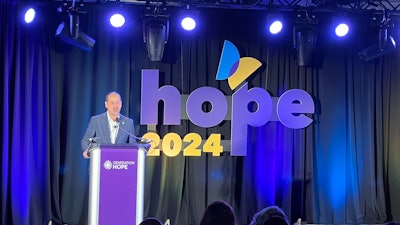 Roberto J. Rodriguez, assistant secretary for planning, evaluation, and policy development at the U.S. Department of Education delivered the keynote address at Hope 2023 in New Orleans.
Roberto J. Rodriguez, assistant secretary for planning, evaluation, and policy development at the U.S. Department of Education delivered the keynote address at Hope 2023 in New Orleans.
Designed to spark new ideas and connections about how to best support student parents nationwide, hundreds of educators, students and community partners gathered in The Crescent City this week for the first national conference of Generation Hope—the nonprofit that provides direct support to teen parents in college as well as their children through holistic, two-generation programming.
Nicole Lynn Lewis, Founder and CEO of Generation Hope said that when she founded the organization in 2010, she knew that the mission was bold and ambitious.
“At the core of Generation Hope’s work is our belief that families are the experts when it comes to the problems that we’re trying to solve,” said Lewis, who is the author of Pregnant Girl: A Story of Teen Motherhood, College, and Creating a Better Future for Young Families. “Our vision for this conference is to create an open and inclusive space where the voices of those who are most impacted can be heard and valued.”
Across the first two days of the conference, ideas from different disciplines and sectors were shared and solutions were shaped collaboratively through a variety of plenary panels and breakout sessions.
“The power of our stories cannot be overstated,” Lewis told the attendees, adding that she hoped participants would think about the “tangible next steps that you can make in your own life, in your work, and in your community.”
Malajah Lopez, a young mother of two, delivered a powerful speech at the opening plenary of the conference. A senior at the University of New Orleans (UNO), she will graduate in May with a bachelor's degree in interdisciplinary studies and has aspirations of pursuing an MBA.
In 2018 at the age of 17, Lopez learned that she was pregnant.
“I can’t apply to colleges outside of New Orleans because I was going to soon be a mother,” Lopez recalled, adding that she ultimately decided to attend UNO, because the school was prepared to provide housing to her and her newborn baby and his father.
“The summer before my first semester was different than most incoming college freshmen,” she said. “Not only was I preparing to begin college and move into my first apartment away from my family, but I was also preparing to become a mother myself.”
Seven months after her first son was born, Lopez was carrying her second child, but now had to contend with the reality that the father of her two children was incarcerated.
“The biggest thing on my mind was how I would juggle being a mother of two, providing for us and still being a full-time college student,” she said, adding that she plowed through her studies because she believed that a college education was “non-negotiable.”
Despite various setbacks and challenges, Lopez was introduced during her junior year to Generation Hope and became a Generation Hope Scholar. She applied, received a scholarship, and “was introduced to a community of young moms like me.”
Now that Lopez is in her final year in college, she said that Generation Hope not only provided her with financial assistance, but an opportunity to share her experiences with other student mothers much younger than her.
Roberto J. Rodriguez, assistant secretary for planning, evaluation and policy development at the U.S. Department of Education said that it's important to elevate, empower and support student parents like Lopez on their journey to gaining a college education. Such a strategy, said Rodriguez, aligns with the policies being implemented by the Biden administration.
In a keynote speech at the conference, he lauded the organization’s two-generation approach and their focus on equity as much needed ingredients for change.
“We need more of a student-centered approach to higher education policy, one that is not defined by this bygone era of what a traditional student is, but instead one that recognizes that our college students are more diverse than ever before,” he said. “They are more likely to be older. They are more likely to be balancing the demands of work and home and raising a family; maybe caring for an elder person. They’re more likely to be the first in their family to attend college, and they’re contending with real world barriers in our system.”
While 1 out of 5 students are parents. 29% of parenting students are food insecure. He said that many student parents are unable to access Supplemental Nutrition Assistance Program (SNAP) benefits and that childcare costs in many states across the country continue to outpace college tuition and fees.
“The measure of our ability to live up to our best principles as a country, is the measure of our ability to build and support an education system that creates opportunity, not just for some, but for all,” he said.



















